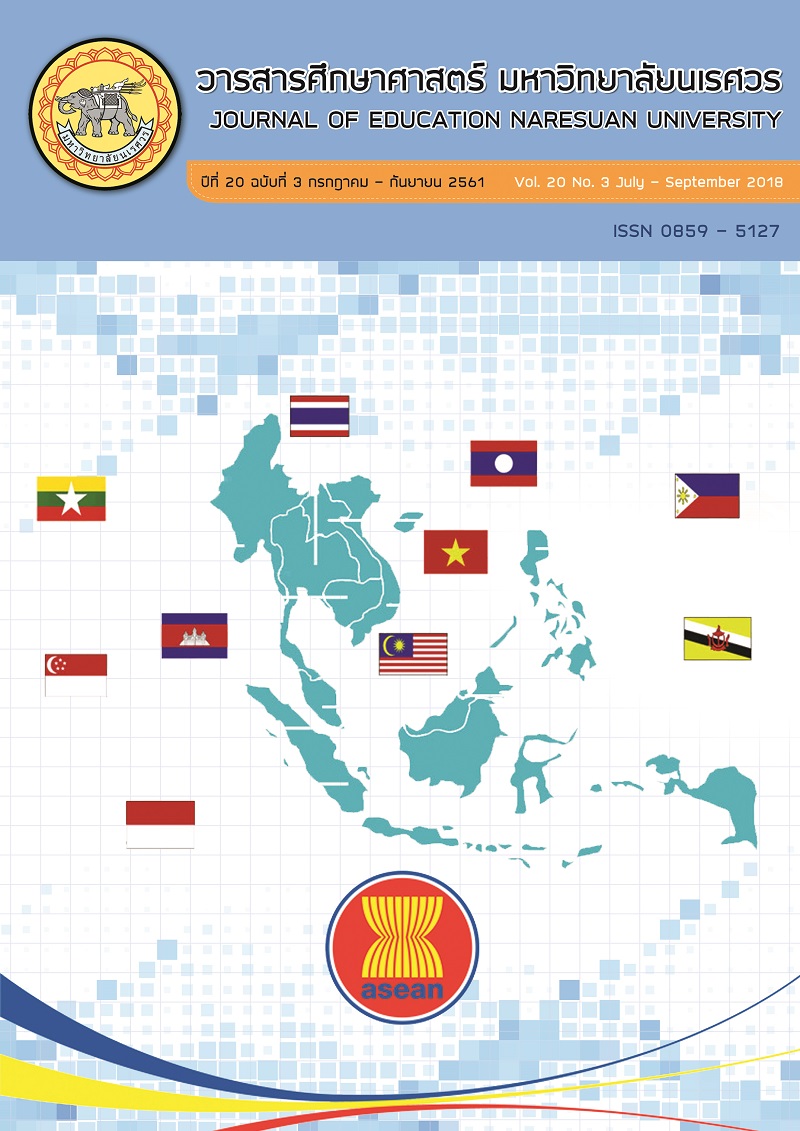ผลการใช้เครือข่ายสังคมออนไลน์ เพื่อส่งเสริมทักษะด้านการสื่อสารสารสนเทศ ด้วยกระบวนการห้องเรียนกลับด้าน; EFFECTS OF USING SOCIAL NETWORK WITH FLIPPED CLASSROOM TO SUPPORT COMMUNICATION SKILLS
Main Article Content
Abstract
การวิจัยครั้งนี้มีวัตถุประสงค์ 4 ประการ คือ 1) เพื่อพัฒนากิจกรรมการเรียนรู้ที่ใช้เครือข่ายสังคมออนไลน์ เพื่อส่งเสริมทักษะด้านการสื่อสารสารสนเทศด้วยกระบวนการห้องเรียนกลับด้าน 2) เพื่อเปรียบเทียบทักษะด้านการสื่อสารสารสนเทศของผู้เรียนกับเกณฑ์ร้อยละ 80 3) เพื่อเปรียบเทียบผลสัมฤทธิ์ทางการเรียนหลังใช้เครือข่ายสังคมออนไลน์กับเกณฑ์ร้อยละ 75 และ 4) เพื่อศึกษาความคิดเห็นของผู้เรียนที่มีต่อการใช้เครือข่ายสังคมออนไลน์ เพื่อส่งเสริมทักษะด้านการสื่อสารสารสนเทศด้วยกระบวนการห้องเรียนกลับด้าน ผู้วิจัยได้ดำเนินการพัฒนากิจกรรมการเรียนรู้ที่ใช้เครือข่ายสังคมออนไลน์ขึ้นโดยผ่านการประเมินจากผู้เชี่ยวชาญและนำไปทดลองกับกลุ่มตัวอย่าง นิสิตสาขาเทคโนโลยีการศึกษาและคอมพิวเตอร์ศึกษา จำนวน 36 คน ผลการวิจัย พบว่า 1) ผลการพัฒนากิจกรรมการเรียนรู้ที่ใช้เครือข่ายสังคมออนไลน์ เพื่อส่งเสริมทักษะด้านการสื่อสารสารสนเทศด้วยกระบวนการห้องเรียนกลับด้านอยู่ในระดับ เหมาะสมมาก ( = 3.86, S.D. = 0.27) 2) ผลการเปรียบเทียบทักษะด้านการสื่อสารสารสนเทศของผู้เรียนกับเกณฑ์ร้อยละ 80 พบว่า ทักษะด้านการสื่อสารสารสนเทศสูงกว่าเกณฑ์ อย่างมีนัยสำคัญทางสถิติที่ระดับ .05 3) ผลการเปรียบเทียบผลสัมฤทธิ์ทางการเรียนกับเกณฑ์ร้อยละ 75 พบว่า คะแนนผลสัมฤทธิ์หลังเรียนสูงกว่าเกณฑ์อย่างมีนัยสำคัญทางสถิติที่ระดับ .05 และ 4) ผลการศึกษาความคิดเห็นของผู้เรียนที่มีต่อการใช้เครือข่ายสังคมออนไลน์ เพื่อส่งเสริมทักษะด้านการสื่อสารสารสนเทศด้วยกระบวนการห้องเรียนกลับด้าน โดยรวมอยู่ในเห็นด้วยมาก ( = 4.03, S.D. = 0.29)
This research included four objectives; 1) to develop learning activities using social network with Flipped Classroom to support communications and information skills (CIS).
2) To compare the CIS of the students with criteria 80 percent. 3) To compare the students achievements with criteria 75 percent. 4) To study the opinions of the students towards using social network with flipped classroom to support CIS. In this study, the learning activities developed by the researcher was evaluated by experts and experimented with 36 students in technology education and computer.
The findings of this research are 1) the learning activities using social network with flipped classroom to support CIS is appropriate in high level ( = 3.86, S.D. = 0.27),
2) the students’ CIS skills is higher than criteria of 80% at .05 level of significant, 3) the students’ learning achievements is higher than criteria of 75% at .05 level of significant, and 4) opinions towards using the social network with flipped classroom in learning activities, students were generally satisfied at a high level ( = 4.03, S.D. = 0.29).
Article Details
The owner of the article does not copy or violate any of its copyright. If any copyright infringement occurs or prosecution, in any case, the Editorial Board is not involved in all the rights to the owner of the article to be performed.
References
Jacobson, L. (1993). Welcome to the virtual world. In Richard Swadley (Ed.). On the cutting edge of technology (pp. 69–79). Carmel, IN: Sams.
Jeremy F. Strayer. (2007). The effects of the classroom flip on the learning environment: A comparison of learning activity in a traditional classroom and a flip classroom that used an intelligent tutoring system (Doctoral dissertation). Columbus: Ohio State University.
Noutrawong, R. (2014). Flip your classroom. Academic Journal, 17(1), 2-13. (in Thai)
Panyarot, S. (2012). 7C for good communication. Retrieved June 5, 2015, from http://www.oknation.net/ blog/markandtony/2012/04/05/entry-4 (in Thai)
Ra-Ngubtook, W. (2000). Lesson plan of student-centred learning (3rd ed.). Bangkok: Wattanapanich. (in Thai)
Raphiphan, R. (2014). Thailand Zocial Awards 2014. Retrieved May 12, 2015, from http://www.it24hrs.com/2014/thai-social-network-2014/ (in Thai)
Sutbonit, S., Tayraukham, S., & Kumpol, B. (2014). Comparison of learning responsibilities attitudes towards learning and learning achievement in science subject of Matthayomsueksa 1 students who learned using flipped classroom activities and traditional learning activities. Journal of Education, Mahasarakham University, Special Issue, 164-178. (in Thai)
Tungkunanan, P. (2014). Classroom and learning resource management (3rd ed.). Bangkok: Faculty of Industrial Education and Technology, King Mongkut's Institute of Technology Ladkrabang. (in Thai)


